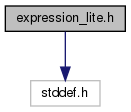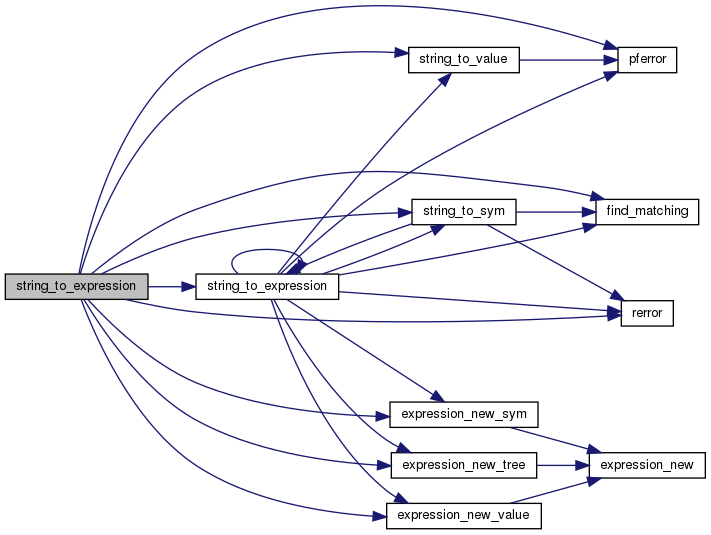#include <stddef.h>
Include dependency graph for expression_lite.h:

Go to the source code of this file.
Typedefs | |
| typedef struct expression * | expression_t |
Functions | |
| expression_t | expression_new (void) |
| New blank expression. More... | |
| void | expression_free (expression_t exp) |
| Free an expression. More... | |
| value_t | expression_evaluate (expression_t exp) |
| void | expression_to_string (char *dst_str, expression_t src_exp) |
| Expression to String. More... | |
| expression_t | string_to_expression (size_t str_len, char const *str) |
| Convert String to an Expression. More... | |
Detailed Description
- Date
- May 3, 2014
Does not include any other project header file. This ensures that there are no circular dependencies.
Typedef Documentation
◆ expression_t
| typedef struct expression* expression_t |
Function Documentation
◆ expression_evaluate()
| value_t expression_evaluate | ( | expression_t | exp | ) |
Here is the call graph for this function:

◆ expression_free()
| void expression_free | ( | expression_t | exp | ) |
Free an expression.
- Parameters
-
exp The expression to free
Here is the call graph for this function:

◆ expression_new()
| expression_t expression_new | ( | void | ) |
New blank expression.
This function creates the most basic empty expression.
- Returns
- A new empty expression
◆ expression_to_string()
| void expression_to_string | ( | char * | dst_str, |
| expression_t | src_exp | ||
| ) |
Expression to String.
Here is the call graph for this function:

◆ string_to_expression()
| expression_t string_to_expression | ( | size_t | str_len, |
| char const * | str | ||
| ) |
Convert String to an Expression.
Parses a string into an expression.
- Note
- level was type int - changed to unsigned to temporarily quiet compiler
- Bug:
- Cannot parse negative numbers
- Warning
- Symbols must start with ALPHA chars to be properly identified.
Algorithm
Parsing Overview
- Step 1: Recording details about the string while scanning from left to right.
- Step 2: There are two real cases. The string is a single number (with no operations) or it is two sub-expressions joined by an operation.
Cases:- If it is a simple number, we know how to parse it and create a value expression.
- If it is not just a number, we want split the string about the operation at the lowest level. (in practice, we end up finding the one that is farthest left of the lowest level) We then construct a tree expression with the chosen operation and the sub-expression results from running the function recursively on each of the sub-strings.
- Parameters
-
str_len Length of given string str String to parse
- Returns
- The expression_t representation of the inputed string
- Test:
- Test for negative values
- Todo:
- Allow symbols to be detected when they start with numeric digits also. string_to_sym is already compatible.
< Store original index
< Used to explore the presence of a symbol parameter
- Todo:
- Do series of additional syntax checks here.
- Todo:
- Syntax Check: Check that level==0
- Todo:
- Syntax Check: Check that oparen_count==cparen_count
- Note
- left_buf and right_buf were changed to use malloc to avoid errors with C90 compilers
Here is the call graph for this function:

